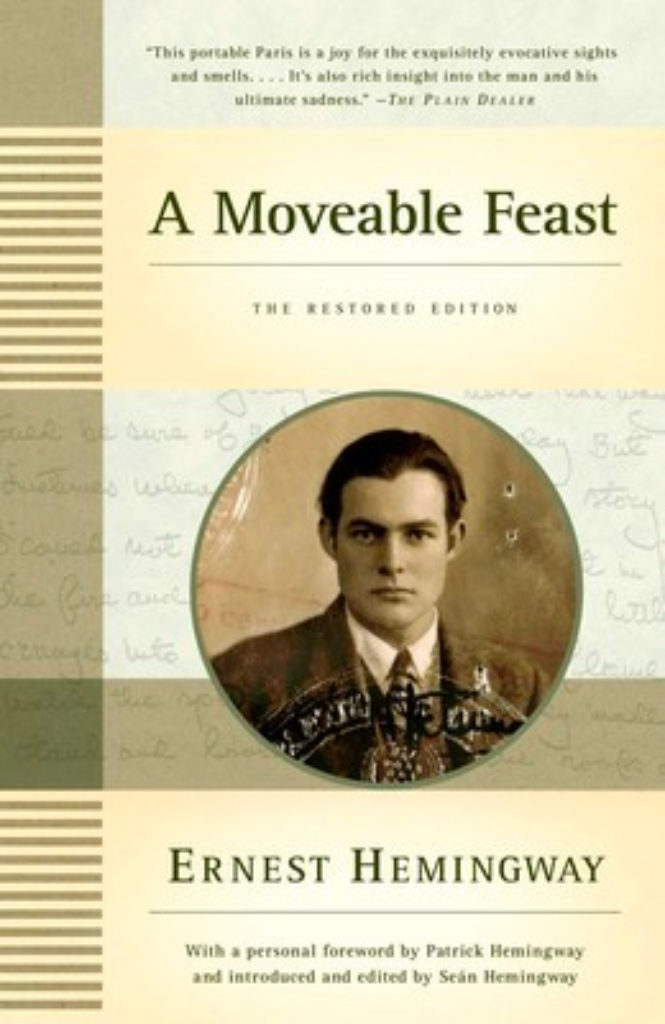A Moveable Feast: The Restored Edition by Earnest Hemingway has been reviewed by PluggedIn.

A Moveable Feast: The Restored Edition by Earnest Hemingway has been reviewed by PluggedIn.
Hemingway wrote these slice-of-life essays as a young man living in Paris in the 1920s. They were discovered and published posthumously in the 1960s. Several versions of this book exist, each with slight but hotly debated variations.
Earnest Hemingway and his first wife, Hadley, experienced both success and hunger during his early years as a writer. They enjoyed skiing, betting on horses and drinking at Parisian cafes. During this period, their son, Jack (nicknamed Bumby), was born.
Hemingway enjoyed the company of many well-known authors and painters. Gertrude Stein advised and hosted him often, until he overheard a strange quarrel that ended their comfortable relationship. Ezra Pound and F. Scott Fitzgerald were also his frequent companions. While he described Pound as a close and generous friend, his portrait of Fitzgerald was less flattering. Hemingway wrote about the man’s many insecurities, the Fitzgeralds’ frequent alcohol abuse and Zelda Fitzgerald’s insanity.
Hemingway’s essays described his interactions with a number of other artists, painters and editors. Some tried to take advantage of his status. Some, like T.S. Elliot, he tried to help financially. Most drank in excess at Parisian cafes while intermittently creating art.
Hemingway also wrote about teaching Pound to box and supporting a budding boxer named Larry Gains. In later essays, Hemingway wrote about Hadley’s friend Pauline coming to live with them. The temptation of having two women at his disposal became too great, and he and Pauline had an affair. He and Hadley eventually divorced, and she remarried a man Hemingway said was much better than himself. Pauline became the second of Hemingway’s four wives.
None
Zelda Fitzgerald comments that Al Jolson is greater than Jesus.
None
The Lord’s name is used in vain. Profanities including h—, s—, a–, d–n, b–ch, b–tard appear a number of times. Hemingway describes author and painter Wyndham Lewis as having the eyes of an unsuccessful rapist. Hemingway and his wife see a biker crash and hear his head crack inside his helmet in a gruesome way.
Hemingway writes about his discussions on sexuality with lesbian author Gertrude Stein. He admits to having some fear of and prejudice against homosexuality in certain circumstances. In one chapter, Stein calls male homosexuality repugnant and says it leads men to be disgusted with themselves afterward. Their shame causes them to turn to drink and drugs and change partners frequently, she says. By contrast, she believes female homosexuality involves nothing embarrassing and that women who practice it can live happy lives together.
Hemingway has drinks with a painter named Pascin and two models, one of whom is a lesbian, who also likes men. The drunk painter urges Hemingway to bang her, but Hemingway replies Pascin has probably done that enough already for one day. The conversation turns to the size of male anatomy, and the model says everyone is the same size in bed.
In another chapter, F. Scott Fitzgerald reveals that his wife has told him he is not built (sexually) to make any woman happy. Since she is the only woman with whom he’s ever had sex, he asks Hemingway to tell him whether the size of his genitals is normal. The two men slip into the bathroom, and Hemingway assures him it’s fine.
Hemingway often mentions his own happy sex life with his wife. In later essays, he writes about having an affair with his wife’s friend and being in love with both women at once. He eventually marries the other woman. He uses a metaphor about whores swallowing semen. Another time, he suggests selling his work to magazines and letting them change it at will would be whoring.
Alcohol/Drugs: Hemingway and his cohorts drink alcohol often and several are addicted to drugs or alcohol. At one point, Hemingway is tasked with holding opium for a friend, who is trying to detox in case the man is in desperate need of the drug. Hemingway notes that the doping of horses in horse racing is common during this time period.
The restored edition, edited by one of Hemingway’s grandsons, features several segments not included in earlier versions of A Moveable Feast. Some chapters have also been renamed and placed in a different order, and Hemingway’s original use of second-person narrative has been restored in some places.
You can request a review of a title you can’t find at reviewrequests@family.org.
Book reviews cover the content, themes and worldviews of fiction books, not their literary merit, and equip parents to decide whether a book is appropriate for their children. The inclusion of a book’s review does not constitute an endorsement by Focus on the Family.